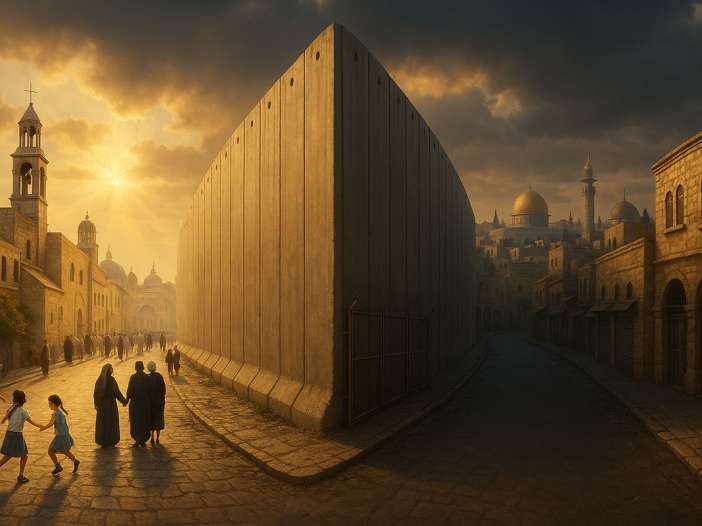
|
Getting your Trinity Audio player ready...
|
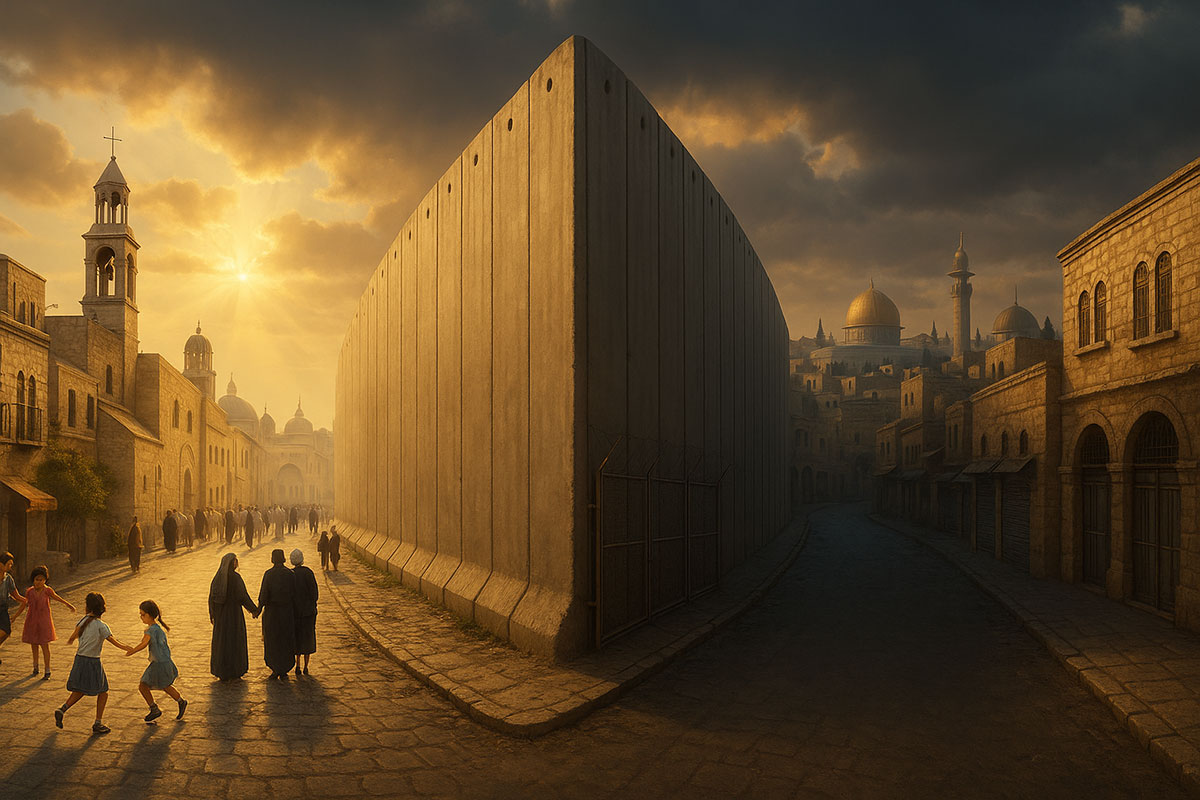
Archbishop Desmond Tutu:
My dear friends, the Holy Land is not merely a place on a map. It is the living cradle of our faith — the streets where Christ walked, the hills where He prayed, the valleys where He healed. But today, the Body of Christ here suffers under the weight of walls, checkpoints, and the slow erosion of community.
I have seen walls before. I have lived in their shadow. And I know that the walls we build to keep others out eventually imprison our own souls. In South Africa, the wall was called apartheid. Here, it has another name, but the wound it leaves is the same.
These conversations with Mother Agapia and her companions are not polite theological debates; they are cries from the heart, testimonies from those who live where the stones are ancient, but the injustice is modern.
I urge you — do not read these words as distant observers. Read them as if your own church doors were locked, your own holy sites made unreachable, your own children’s future fenced in. For what is done to the least of these, our brothers and sisters in Bethlehem and Jerusalem, is done to Christ Himself.
Let us listen with humility. Let us speak with courage. And let us act with love that refuses to be silent.
(Note: This is an imaginary conversation, a creative exploration of an idea, and not a real speech or event.)

Topic 1: Faith Under Occupation: Living as a Christian in the Holy Land
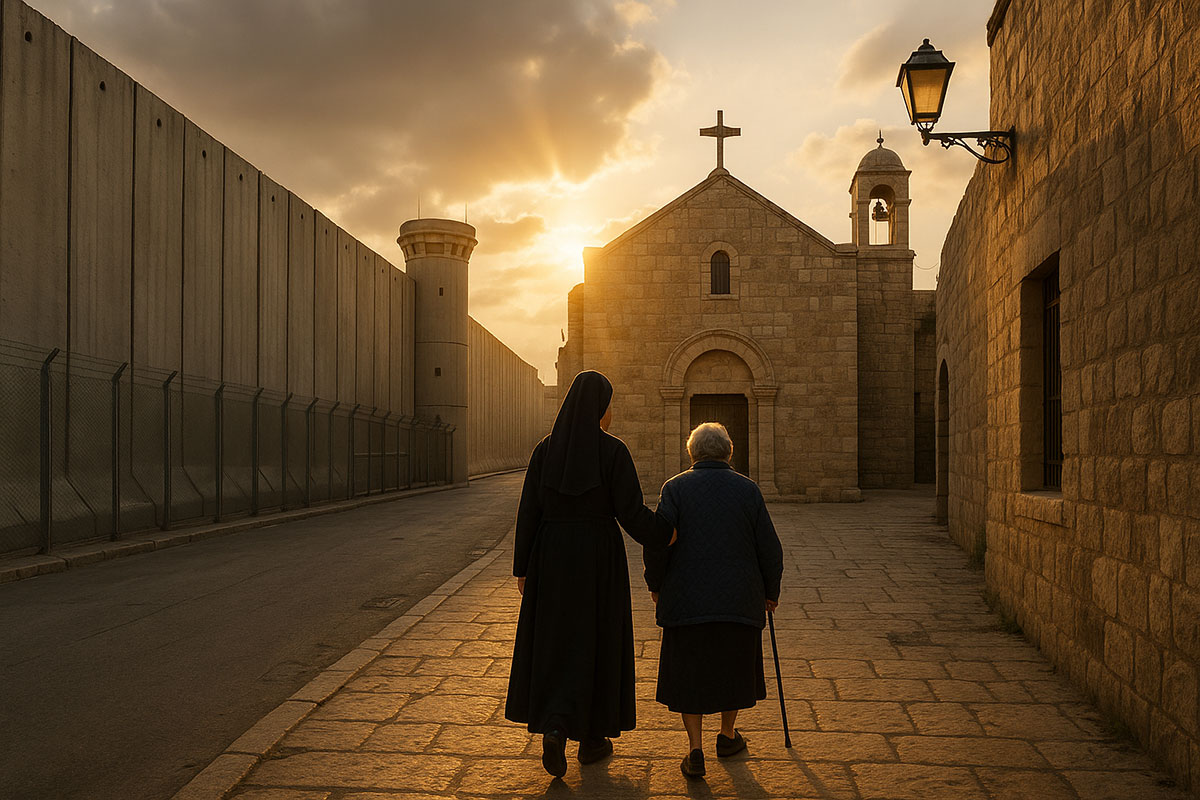
Moderator: Archbishop Atallah Hanna
Participants: Mother Agapia Stephanopoulos, Mitri Raheb, Cornel West, Marc Lamont Hill, N.T. Wright
Archbishop Atallah Hanna (opening)
We gather today in Jerusalem to speak of faith lived under the shadow of walls and checkpoints. Not as abstract theology, but as breath, as bread, as the sound of bells silenced by distance. Our question is not only how Christians survive here, but how faith is lived when it must pass through a metal detector.
Question 1 – What does it mean to keep faith when movement itself is restricted?
Mother Agapia
Faith here is a rhythm interrupted. It is planning your worship around the possibility of a permit. It is celebrating Easter knowing half your parish cannot reach the church. Yet it is also finding ways to make the liturgy portable—into living rooms, courtyards, even the side of the road. Faith becomes less about a location and more about a constant turning of the heart toward God, no matter the walls.
Cornel West
This is the blues of faith, my sister. It’s that deep moan from the gut that says, “They can cage my body, but not my soul.” To love in a loveless situation—that’s the highest form of resistance. Faith under occupation is dangerous because it refuses to be bought or silenced.
N.T. Wright
The early church knew something of this. Paul wrote letters in chains, and yet his words carried across empires. Restriction can paradoxically make faith more urgent, more concentrated—like light through a narrow lens. The challenge is to keep the beam fixed on Christ, rather than on bitterness.
Marc Lamont Hill
And here’s the reality: occupation turns the most basic act of devotion into a political act. Crossing a checkpoint for Sunday liturgy is both a spiritual pilgrimage and an act of defiance. The system fears that kind of faith because it builds community where the occupation seeks fragmentation.
Mitri Raheb
For us in Bethlehem, faith is tied to place. We’re not visitors; we’re rooted here for two thousand years. When they limit our movement, they are not just limiting us physically—they are attempting to sever the connection between the stones of the church and the living stones of the people.
Question 2 – How do you sustain hope when the situation seems unchanging?
Marc Lamont Hill
Hope here is not naïve optimism. It is survival. It is a mother baking bread while soldiers patrol outside, a priest tending his altar when the congregation has dwindled to a few elders. Hope is built in small acts, repeated daily, until they become unbreakable.
Mother Agapia
I think of hope as the oil in the lamp. Without replenishing it—through prayer, through acts of mercy, through remembering our ancestors’ endurance—the flame dies. We tell our children the stories of faith from before the wall, so they know their history is bigger than concrete.
N.T. Wright
Christian hope is not a vague wish; it is the certainty that God’s future is already breaking into the present. Even in the darkest times, the resurrection stands as a historical reality and a promise: what is sown in weakness will be raised in glory.
Cornel West
Hope is not the same as certainty. It’s a choice we make every day, to be faithful to the witness of love in a loveless world. It’s prophetic stubbornness. Brother Martin Luther King Jr. called it “a tough mind and a tender heart.”
Mitri Raheb
I often remind my community: empires rise and fall, but the people of this land remain. The Roman Empire fell. The Ottoman Empire fell. Occupations end. Our calling is to be ready when the dawn comes.
Question 3 – What can Christians outside the Holy Land do to stand with you in meaningful ways?
Cornel West
First, tell the truth. Strip away the lies of sanitized narratives. Stand on the side of the oppressed, not because they are perfect, but because God commands it. And if you’re in the U.S., speak to your politicians with moral fire.
Mitri Raheb
Visit us—not only as tourists, but as pilgrims who come to listen. Worship with us, see our daily reality, and return home as witnesses. Your voice can open doors we cannot.
Mother Agapia
Educate your churches about the living church here. Too often, they imagine the Holy Land as a museum of biblical sites, forgetting that we—the living body of Christ—are still here. Support our schools, our clinics, our parish life. Keep the church alive, not just the stones.
N.T. Wright
Remember that solidarity is part of discipleship. Paul collected funds for the church in Jerusalem, understanding that unity across borders was the gospel in action. Your support—prayer, financial, political—embodies that same truth today.
Marc Lamont Hill
And amplify Palestinian Christian voices. Don’t let our stories be told only by those who erase the people who live here. The more the world hears directly from us, the harder it is to ignore our existence.
Archbishop Atallah Hanna (closing)
Faith under occupation is not simply endurance—it is a living, breathing refusal to let the holy be desecrated by fear. Here, the liturgy and the struggle are one. May those who hear us today remember: the church is alive, but it must be defended with both prayer and action.
Topic 2: Muslim-Christian Solidarity in Daily Life
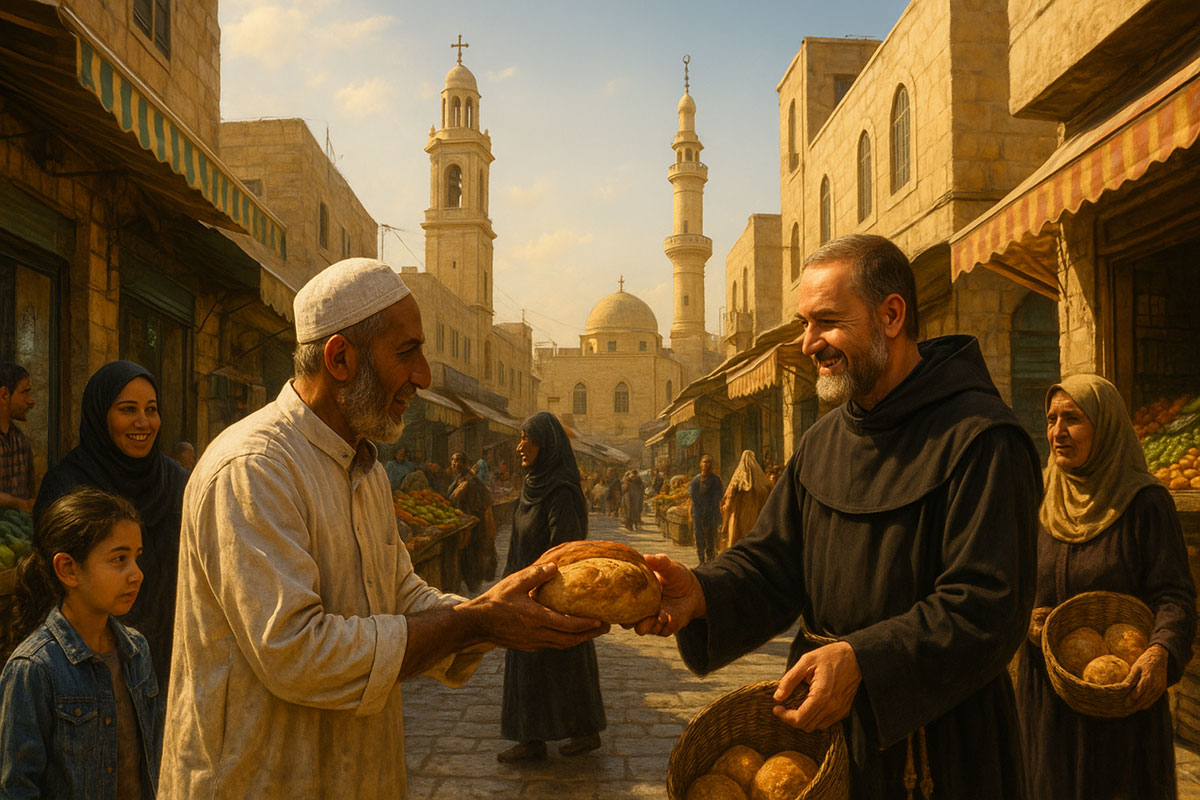
Moderator: Sheikh Ekrima Sabri
Participants: Mother Agapia Stephanopoulos, Rabbi Lynn Gottlieb, Fr. Elias Chacour, Azza Karam, Imam Omar Suleiman
Sheikh Ekrima Sabri (opening)
In Jerusalem and Bethlehem, faith communities have lived side by side for centuries—sometimes in peace, sometimes in tension. Today we speak of solidarity, not as an abstract wish, but as the bread and salt we share in our daily lives. I want to ask: what does it mean to walk together when the road is watched, and the walls rise between us?
Question 1 – What does real solidarity between Muslims and Christians look like in everyday life?
Mother Agapia
Solidarity here is not just a handshake at an interfaith conference—it’s the neighbor who brings you medicine when the road is closed. In my school, the majority of students were Muslim, and many of my staff as well. We celebrated each other’s holy days, we mourned together at funerals. It is friendship that has nothing to prove.
Imam Omar Suleiman
True solidarity begins in the heart. It’s easy to speak of unity when times are good; the test comes when your neighbor is targeted. In Gaza, in Jerusalem, in Bethlehem, I’ve seen Muslims protect Christian churches and Christians shelter Muslim families. That is solidarity as a sacred duty.
Fr. Elias Chacour
I always say, “We are not destined to live together—we are condemned to live together.” But that is not a curse; it is a call to grow. Real solidarity is when your suffering becomes mine, and my joy becomes yours. We share the same air, the same bread, the same land. That is already a form of communion.
Azza Karam
In global forums, I’ve seen how local acts of solidarity ripple outward. A Christian family attending an iftar in Jerusalem sends a message that no wall can block: we belong to each other. And belonging is the seed from which peace grows.
Rabbi Lynn Gottlieb
When I’ve visited Palestine, I’ve been welcomed by both Christians and Muslims into homes and holy spaces. That welcome is radical—it says, “Despite what politics says, you are part of my family.” Solidarity is not an alliance of convenience; it’s a covenant of shared humanity.
Question 2 – What threatens this solidarity, and how do we protect it?
Rabbi Lynn Gottlieb
Propaganda is the greatest threat—narratives that say we cannot trust each other. Occupation thrives on fear. The antidote is storytelling, where we tell our children about the years of harmony, not only the moments of conflict.
Mother Agapia
The danger is in letting political agendas rewrite our relationships. If we allow ourselves to be defined by the walls, then the walls win. We must keep visiting each other’s homes, even if it means finding new paths around the barriers.
Fr. Elias Chacour
I’ve seen entire generations taught to suspect their neighbors. The church and the mosque must counter that with teachings that remind us of our shared Creator. We must teach forgiveness as much as we teach resistance.
Imam Omar Suleiman
State policies can weaponize religion, turning it into a political tool. We must de-weaponize faith—bring it back to its prophetic role of defending the oppressed, regardless of their creed.
Azza Karam
Solidarity requires active maintenance. It is like a garden that must be watered daily. We must create shared spaces—cultural centers, schools, markets—where meeting each other is normal, not exceptional.
Question 3 – How can the world support Muslim-Christian unity here?
Imam Omar Suleiman
By amplifying the stories of unity that already exist. Too often, the global media only reports division. Share the moments of mutual protection, of joint worship, of shared resistance to injustice.
Azza Karam
Support community-led initiatives that bring Muslims and Christians together—projects in education, healthcare, and the arts. These are the quiet engines of peace.
Mother Agapia
Challenge your own communities abroad to stop importing division. Many Christians in the West see Muslims as strangers; they should learn from us here, where Muslims have been our friends and colleagues for centuries.
Fr. Elias Chacour
Come here and see for yourself. Walk the streets of Nazareth or Bethlehem and watch the children play together. When you witness it, you will understand that our unity is not a theory—it’s a reality that needs protection.
Rabbi Lynn Gottlieb
And commit to interfaith activism at home. If Jews, Christians, and Muslims in America, Europe, and beyond can build bonds locally, it strengthens the moral call to support unity in the Holy Land.
Sheikh Ekrima Sabri (closing)
In our shared streets, we have learned that solidarity is not a slogan—it is bread broken together, water carried for each other, tears shed side by side. If the world wants to help, let them first learn to live as neighbors where they are. Only then will their solidarity here be true.
Topic 3: The Wall, Land Loss, and Displacement
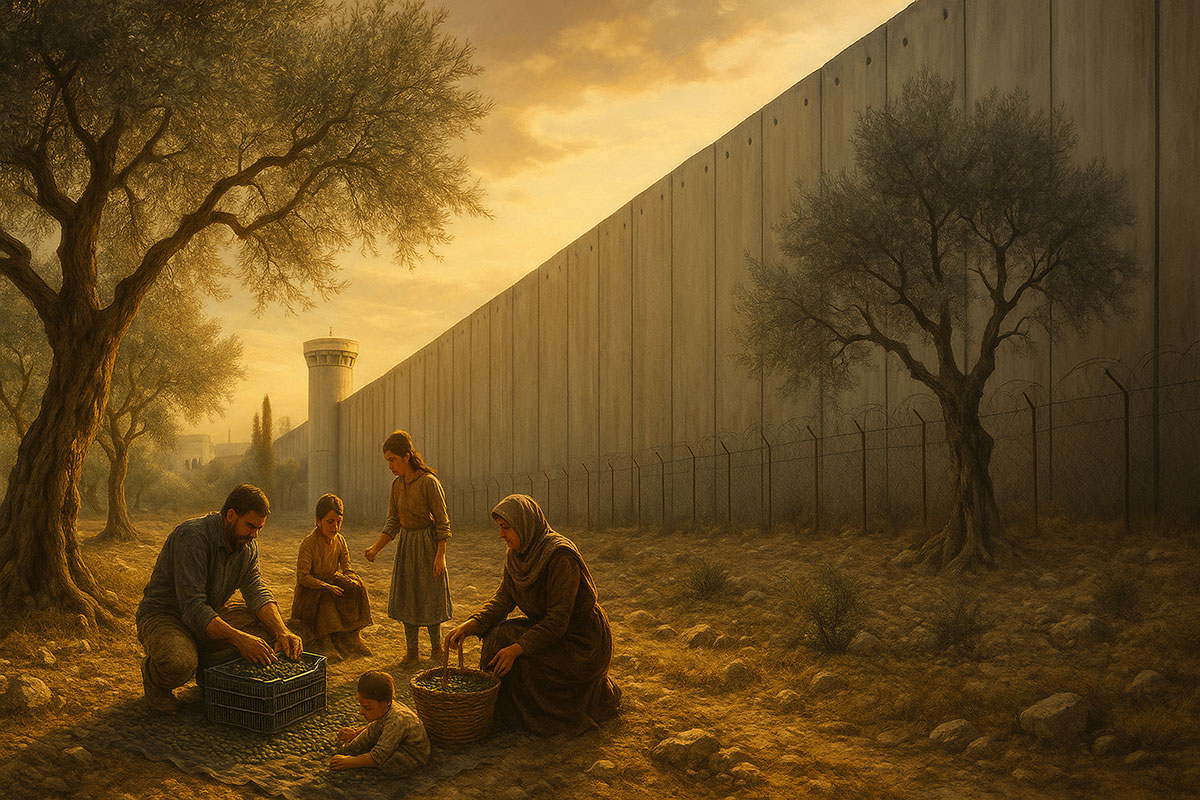
Moderator: Ilan Pappé
Participants: Mother Agapia Stephanopoulos, Sara Roy, Edward Said (hypothetical, posthumous), Jeremy Scahill, Bishop William Barber II
Ilan Pappé (opening)
The wall is more than concrete; it is the architecture of a policy—one designed to fragment land, communities, and memory. We will speak today of what is lost when a wall rises, not only in soil taken, but in the uprooting of lives and the erasure of history.
Question 1 – How has the wall reshaped life for the people you serve?
Mother Agapia
Before the wall, Bethlehem was part of a living network—people could travel for work, worship, or to see relatives. Now the wall slices through that life like a blade, severing the city from Jerusalem and the surrounding villages. Many of my parishioners can see their church from their window but need hours—and a permit—to reach it. The wall turns neighbors into strangers.
Edward Said
The wall is not merely a security measure; it is the physical manifestation of the politics of exclusion. It says, “You do not belong here.” It transforms the landscape into an instrument of dispossession, redefining who is visible and who is invisible.
Sara Roy
In my fieldwork, I’ve seen how the wall destroys economies. Farmers are cut off from their olive groves, merchants from their markets. It is slow violence—destroying livelihoods not in one stroke, but by attrition.
Jeremy Scahill
From an investigative perspective, the wall is also a control mechanism. It funnels movement through checkpoints where surveillance is absolute. That kind of power over movement is a political weapon—one that can be used to coerce entire populations.
Bishop William Barber II
The wall is a moral scandal. When you use walls to divide the children of God, you are not building security—you are building sin into the landscape. It is a form of structural violence that churches must confront as part of their prophetic mission.
Question 2 – What is lost when land is taken?
Sara Roy
Land is more than property—it’s memory, identity, and security. When a family loses its land, it loses its livelihood and its place in the story of its people.
Mother Agapia
In Bethlehem, confiscated land often belonged to families for generations, sometimes centuries. Losing it is like losing part of your ancestry. And when the land taken contains Christian holy sites, the loss is spiritual as well as physical.
Edward Said
Land theft is the quiet engine of displacement. The moment you remove people from their land, you begin erasing their history and their future in that place. It is cultural cleansing disguised as bureaucracy.
Bishop William Barber II
In America, we saw similar patterns with Native land dispossession. The loss was not only material; it was the ripping away of sacred connections. That kind of wound echoes through generations.
Jeremy Scahill
And let’s be blunt—land loss here is not an accident. It is a strategy. When you seize land and control movement, you force people into economic desperation, making it easier to pressure them to leave.
Question 3 – How do we resist and heal from displacement?
Mother Agapia
We resist by staying. Every family that refuses to sell, every church that keeps its doors open, every olive tree replanted after being uprooted—these are acts of holy resistance.
Bishop William Barber II
We must join struggles across borders. The fight against displacement in Palestine is connected to housing justice in America, to land rights in Africa, to Indigenous sovereignty in Australia. We rise together, or we fall separately.
Edward Said
We must also resist the erasure of memory. Teach the history, record the names, mark the land in stories even if you cannot walk it. Memory is the map by which a displaced people finds their way home.
Sara Roy
Economically, we need to build local resilience—cooperatives, community agriculture, shared resources. When people can feed themselves and sustain their communities, displacement loses some of its coercive force.
Jeremy Scahill
International exposure is critical. The wall hides much from outside eyes. Journalists, scholars, and activists must keep telling the stories until they break through the concrete silence.
Ilan Pappé (closing)
Walls can control space, but they cannot control conscience. Land can be taken, but the bond between people and their home can endure. If the world is silent, displacement becomes permanent. If the world speaks, even walls can fall.
Topic 4: Christian Zionism and Theology of the Land
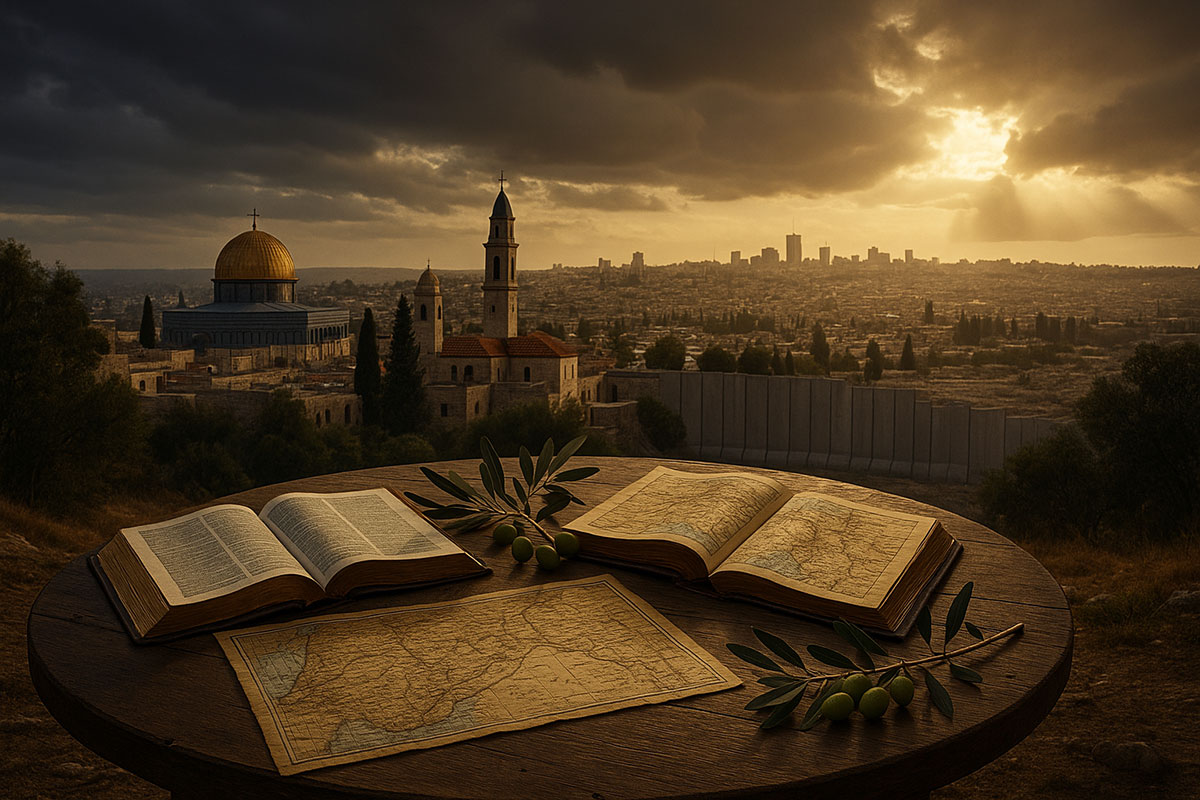
Moderator: Rev. Dr. Stephen Sizer
Participants: Mother Agapia Stephanopoulos, Gary Burge, Jim Wallis, Walter Brueggemann, Beth Moore
Rev. Dr. Stephen Sizer (opening)
The question of land in the Bible is inseparable from the question of justice. Yet in our time, certain interpretations have turned the promises of God into political weapons. Christian Zionism has grown into a powerful movement, influencing foreign policy and theology alike. Today we ask: how should Christians think about the land, and how do we keep our theology from becoming an instrument of oppression?
Question 1 – What’s the core theological problem with Christian Zionism?
Mother Agapia
It replaces the living gospel with a political blueprint. In the name of prophecy, it justifies policies that dispossess the very Christians who have lived here for centuries. Instead of standing with the body of Christ in the Holy Land, it stands with the machinery of occupation.
Walter Brueggemann
The land in the Old Testament is always given conditionally—its possession is tied to justice, mercy, and care for the vulnerable. To claim divine right to the land while ignoring these conditions is a misuse of the biblical witness.
Gary Burge
Christian Zionism often flattens the New Testament into a continuation of Old Testament land promises, without acknowledging how Jesus redefines “inheritance” as belonging to the meek, the poor in spirit, and those who hunger for righteousness.
Beth Moore
I’ve spent years teaching Scripture in evangelical contexts. I believe many Christians who support Zionism do so out of sincere desire to honor the Bible—but they have been given a one-sided reading. Once you see the people harmed by those policies, your heart cannot stay the same.
Jim Wallis
It turns the Kingdom of God into a geopolitical agenda. Jesus never said, “Blessed are the empire builders.” He said, “Blessed are the peacemakers.” Christian Zionism often blesses the sword, not the cross.
Question 2 – How do we reclaim a biblical theology of the land?
Gary Burge
By returning to the full biblical narrative. The land was always meant to be a place of blessing for all nations, not a fortress for one people. In Christ, the promises expand, not contract.
Mother Agapia
We must remember that the church here is part of the land’s living story. Theology that ignores us is theology divorced from reality. Listen to the voices of those who have prayed here for two millennia.
Beth Moore
Reclaiming biblical theology means teaching the Bible as a story of reconciliation—between God and humanity, and between peoples. That doesn’t mean erasing difference, but it does mean dismantling theologies that sanctify injustice.
Walter Brueggemann
The prophets tied the right to the land to economic justice—Jubilee laws, care for the alien, protection of the poor. If these are absent, the land itself “vomits out” its inhabitants. Our theology must be as concerned with these demands as it is with ancient promises.
Jim Wallis
And we must emphasize that the church’s mission is not to protect political borders, but to embody the love of Christ. If our theology produces division and displacement, it is not the gospel.
Question 3 – How should Christians respond to the political power of Christian Zionism today?
Beth Moore
We need courageous teaching in churches—especially in evangelical spaces—so believers can see the full picture, not just the headlines and prophecy charts.
Jim Wallis
Political influence must be met with moral witness. Lawmakers need to hear from Christians who reject the misuse of faith for political ends. Silence allows the loudest voices to define the church’s stance.
Mother Agapia
Support the living church here, materially and spiritually. Challenge your leaders to meet with Palestinian Christians, not only Israeli officials. This will open eyes in ways that sermons alone cannot.
Gary Burge
Educate yourself and others. Learn the history of the Holy Land beyond the soundbites. Knowledge breaks the spell of propaganda.
Walter Brueggemann
Above all, we must speak prophetically: God’s purposes cannot be reduced to nationalistic projects. When theology becomes an idol, it must be torn down.
Rev. Dr. Stephen Sizer (closing)
Christian Zionism thrives when Scripture is read without justice, and when the people of the land are ignored. Our calling is to bring the text back into conversation with the living body of Christ here—and to remember that the land belongs, ultimately, to the Lord, who demands justice as the condition for its blessing.
Topic 5: Preserving the Living Church, Not Just a Museum

Moderator: Patriarch Theophilos III
Participants: Mother Agapia Stephanopoulos, Pope Francis, Jonathan Jackson, Dr. Diana Butler Bass, Rowan Williams
Patriarch Theophilos III (opening)
The stones of our churches tell the story of Christ’s life, death, and resurrection. But stones alone are not the church. Without the living body of believers, these holy places risk becoming mere museums for tourists. Today, we speak of how to keep the flame alive so that the Church in the Holy Land remains a beating heart, not a relic under glass.
Question 1 – What is the danger of the Holy Land becoming only a museum?
Mother Agapia
When the living community disappears, the faith becomes an exhibit. Tourists come, take photographs, and leave, without ever hearing the hymns sung in their original places, without seeing the Gospel embodied in daily life. The danger is that the world will remember the buildings but forget the people.
Pope Francis
A church without a people is like a body without breath. We must never allow the Holy Land to be only stones and memories—it must be a place where Christ is encountered in the hospitality of its people and the witness of their daily lives.
Jonathan Jackson
As an Orthodox Christian, when I come here, I’m not just visiting the past—I’m meeting the living faith of those who keep it alive against all odds. If they are gone, future generations will inherit a beautiful but empty shell.
Dr. Diana Butler Bass
The museumification of the faith is a symptom of a deeper crisis: when we preserve the past without nurturing the present. Churches become places we look at, rather than communities we belong to.
Rowan Williams
The true legacy of the Holy Land is not simply historical—it is sacramental. The presence of worshiping communities is part of that sacrament. Without them, the sacred is reduced to archaeology.
Question 2 – What is being done now to keep the Church here alive?
Pope Francis
We work through schools, hospitals, and parish life to serve all—Christian and non-Christian alike. These institutions are seeds of peace and witness to the Gospel in action.
Mother Agapia
We run schools where Muslim and Christian children learn side by side, keeping communities connected. We also maintain small parish programs, youth ministries, and social aid projects so families have reason to stay rather than emigrate.
Jonathan Jackson
As someone in the arts, I see the power of storytelling—film, music, and literature—to remind the world that the church here is alive. Supporting creative projects is another way of keeping the story from fading.
Dr. Diana Butler Bass
Partnerships between local churches and international congregations are key. When communities abroad “adopt” a parish here, they help sustain both financially and spiritually.
Rowan Williams
Pilgrimage can be a lifeline—when done with integrity. Pilgrims who worship, learn, and serve alongside local Christians become ambassadors for the living church, not just its monuments.
Question 3 – How can Christians around the world ensure the Holy Land’s church remains a living body?
Mother Agapia
Support the people, not just the sites. Fund schools, clinics, and parishes. Advocate for the rights of Christians to live and worship freely here.
Rowan Williams
We must weave the Holy Land into our own prayer life and church life abroad, so that its needs are not an occasional concern but a constant responsibility.
Jonathan Jackson
Tell the stories—through art, through social media, through personal testimony. People act when their hearts are moved.
Pope Francis
Do not be passive. Visit, write to your leaders, and support organizations that protect the dignity and freedom of the Christian community here.
Dr. Diana Butler Bass
Most importantly, see this as part of the global church’s health. A wounded church in the Holy Land is a wound to the body of Christ everywhere.
Patriarch Theophilos III (closing)
The Holy Land is the cradle of our faith, but its life depends not on stones, but on souls. If we lose the living church here, we lose a part of the Gospel’s heartbeat. Let us ensure that the worship, witness, and service of Christians in this land continue—not as echoes, but as living voices.
Final Thoughts By Rowan Williams
We have journeyed, in these conversations, through narrow streets shadowed by walls, across marketplaces where bread is still broken between Muslim and Christian neighbors, into olive groves where the land itself bears the memory of dispossession, and up to hills where Scripture and politics wrestle over the meaning of home.
Mother Agapia’s voice, and those of her fellow witnesses, remind us that the Church is never just its buildings. It is the prayer whispered in a kitchen when the road to the church is blocked. It is the candle lit for an elder by a child. It is the quiet, unyielding decision to remain rooted in a place when the world tells you to leave.
Our calling, wherever we are, is to see the Holy Land not only as a site of pilgrimage but as a living parish — one that is part of our own body in Christ. And if one part of the body suffers, all suffer with it.
Let us take these stories into our own communities, not as curiosities from a distant land, but as reminders that faith is always tested where love meets injustice. And let us commit ourselves anew to the prayer that the walls may fall, the roads may open, and the bells of Bethlehem and Jerusalem may ring freely again, for generations yet to come.
Short Bios:
Mother Agapia Stephanopoulos – American-born Orthodox nun and sister of George Stephanopoulos, she has lived in the Holy Land since 1996, serving as an educator, abbess, and outspoken advocate for Palestinian Christians facing displacement and restrictions under occupation.
Archbishop Atallah Hanna – Greek Orthodox Archbishop of Sebastia in Jerusalem, known for his outspoken defense of Palestinian rights, interfaith solidarity, and commitment to protecting Christian communities in the Holy Land.
Mitri Raheb – Palestinian Lutheran pastor from Bethlehem, theologian, and author, whose work focuses on Palestinian Christian identity, resilience, and cultural empowerment under occupation.
Cornel West – American philosopher, theologian, and activist known for his prophetic voice on justice, race, democracy, and human rights, blending faith with a call for radical love and moral courage.
Marc Lamont Hill – American academic, journalist, and commentator, recognized for his work on social justice, Palestine advocacy, and the intersection of politics and media narratives.
N.T. Wright – Prominent New Testament scholar and former Bishop of Durham, known for his deep historical-theological insights on Jesus, Paul, and the early church.
Sheikh Ekrima Sabri – Former Grand Mufti of Jerusalem and influential Muslim scholar, known for promoting unity among faith communities and defending Palestinian religious rights.
Rabbi Lynn Gottlieb – American rabbi, storyteller, and peace activist engaged in interfaith dialogue and nonviolent movements for justice in Israel-Palestine.
Fr. Elias Chacour – Retired Melkite Catholic Archbishop of Galilee, noted for his lifelong work in fostering reconciliation between Christians, Muslims, and Jews in Israel.
Azza Karam – Secretary-General of Religions for Peace, advocate for global interfaith cooperation, and scholar of religion and development.
Imam Omar Suleiman – American Muslim scholar and founder of the Yaqeen Institute for Islamic Research, known for social justice advocacy and interfaith work.
Ilan Pappé – Israeli historian and author of The Ethnic Cleansing of Palestine, recognized for his critical research on Israeli history and policies toward Palestinians.
Sara Roy – Senior research scholar at Harvard University specializing in the Palestinian economy, Gaza, and the socio-economic effects of conflict and occupation.
Edward Said – Late Palestinian-American intellectual, literary critic, and author of Orientalism, a foundational work in postcolonial studies, and advocate for Palestinian self-determination.
Jeremy Scahill – Investigative journalist and co-founder of The Intercept, known for exposing issues of war, surveillance, and state power.
Bishop William Barber II – American Protestant minister and co-leader of the Poor People’s Campaign, focusing on social justice, poverty, and moral revival.
Rev. Dr. Stephen Sizer – Anglican priest, author, and international speaker known for his critiques of Christian Zionism and advocacy for a biblically grounded theology of justice.
Gary Burge – Biblical scholar and author focusing on the New Testament, the theology of the land, and Christian engagement with the Middle East.
Jim Wallis – Founder of Sojourners, evangelical leader, and social justice advocate connecting biblical faith to action for peace and equity.
Walter Brueggemann – Influential Old Testament scholar known for his work on prophetic imagination, justice, and the land in Scripture.
Beth Moore – American evangelical speaker and author who has engaged in theological reform within evangelicalism, increasingly outspoken on issues of justice and compassion.
Patriarch Theophilos III – Greek Orthodox Patriarch of Jerusalem, custodian of Christian holy sites, and advocate for the protection of the Christian presence in the Holy Land.
Pope Francis – Head of the Catholic Church and sovereign of the Vatican City State, globally recognized for his advocacy for the poor, interfaith dialogue, and peacemaking.
Jonathan Jackson – Emmy-winning actor and Orthodox Christian, noted for his public witness of faith and support for Christian communities in the Holy Land.
Dr. Diana Butler Bass – Historian of Christianity and public theologian focusing on spiritual renewal, church history, and contemporary faith practice.
Rowan Williams – Former Archbishop of Canterbury, respected theologian and poet, known for his contemplative leadership and commitment to global Christian unity.
Archbishop Desmond Tutu – Late South African Anglican bishop and Nobel Peace Prize laureate, famed for his role in ending apartheid and his unwavering voice for justice in Palestine and worldwide.

Leave a Reply